TL;DR:
- Startups need EORs to hire globally without setting up foreign entities, saving time, money, and legal risk.
- EOR vs payrolling: Payrolling handles salary payments; EOR takes on full legal employment and compliance.
- What to look for: Transparent pricing, speed, legal coverage, human support, and startup-friendliness.
- Top providers: This guide compares 10 EORs, including Rivermate, Deel, Remote, Tarmack, and Skuad.
- Why Rivermate fits startups: No hidden fees, real human support, flexible workflows, and 150+ country coverage.
- Demo-ready: Rivermate can get you from quote to first payroll in days.
10 Best Employer of Record (EOR) for Startups in 2026
You’ve secured funding, validated product-market fit, and now it’s time to hire—fast. But expanding globally without local legal entities can feel like a maze of tax rules, labor laws, and compliance risks.
For startups, even one wrong move—like misclassifying an employee or missing a statutory benefit—can result in fines or reputation damage. And building your own entity infrastructure takes months, costs thousands, and pulls focus from product and growth.
These aren’t theoretical risks. In December 2024, Norway’s Supreme Court ruled misclassified contractors must be compensated under labor law, including holiday pay based on actual earnings, with the burden of disproving overpayment falling on the employer. That same month, a class-action lawsuit claimed Scale AI, a $14 billion California-based startup, misclassified workers as contractors, denying them overtime, paid breaks, and expense reimbursement, allegedly violating California labor law.
That’s where Employer of Record (EOR) services come in. Unlike basic payrolling tools, an employer of record takes on legal employment responsibilities so you can focus on hiring the best people, wherever they live.
In this guide, we break down what startups need to know about using an employer of record in 2026, compare the top 10 providers, and explain why Rivermate is a strong fit for scaling teams.
Why startups need an employer of record
Hiring internationally can accelerate growth, but it introduces complexity most early-stage teams aren’t equipped to manage.
Here’s why startups increasingly turn to employer of record services instead of setting up their own legal entities or relying solely on payrolling tools:
1. Speed to hire
Setting up a legal entity can take a few weeks to several months and cost anywhere from approximately $4,000 to $28,000 or more depending on the country. For example, the cost of forming a company in Germany depends on the legal structure. A GmbH requires €25,000 in share capital, but only €12,500 must be paid upfront. A UG (“Mini-GmbH”) can be registered with just €1.
Additional costs include notary fees (starting from €600–€800 depending on complexity and number of shareholders), government fees (€150–€200), administrative expenses, and registered address fees.
Employer of record services let you start onboarding full-time employees within days. That’s critical when your Series A funding depends on rapid market entry or getting engineering talent in-region.
2. Legal employment, not just payroll
Basic payrolling platforms may process salaries, but they don’t cover employment contracts, IP protection, taxes, or local benefits. An EOR becomes the legal employer, assuming liability and ensuring full compliance with labor laws in each country.
3. Compliance and risk management
Labor regulations differ drastically across markets. From mandatory 13th-month pay in the Philippines to probationary period rules in France—one misstep can trigger audits or fines. A global employer of record offers localized contracts and manages compliance continuously. Startups hiring in the country can work with an Employer of Record Philippines to ensure 13th-month pay and other statutory benefits are applied correctly.
4. Budget and cash flow control
Predictable monthly pricing per employee helps finance teams manage costs. With a global EOR like Rivermate, you avoid surprise tax charges, government filings, or year-end reconciliations.
5. Flexibility to scale
Whether you’re hiring one person in Berlin or a support team across Southeast Asia, EORs scale with your needs, without requiring you to spin up operations or local HR teams. Startups that want to build teams in Indonesia can rely on Employer of Record Indonesia support to manage compliant hiring, payroll, and benefits from day one. This makes it easier to test the market without setting up a full legal entity straight away.
What to look for in an EOR for startups
Choosing an Employer of Record isn’t just about picking a vendor with country coverage. For startups, the right EOR can directly impact how fast you can hire, how confident you feel about compliance, and how much you spend over time.
Here’s what startup founders, COOs, and HR leads should prioritize when evaluating employer of record options:
1. Full legal employment support, not just payroll
Some providers position themselves as EORs but only offer payroll processing and contract templates. For example, Reddit users report that they considered Remote and Deel for EOR services, but the platforms lacked full compliance management, accurate employee classification, and dedicated support.
True EORs handle:
- Local employment contracts and benefits administration
- Payroll processing
- Onboarding and offboarding
- Proper worker classification
- Statutory tax filings and employer contributions
- Intellectual property protection
- Legal liability and indemnification in each market
If you’re hiring full-time employees, make sure the provider actually becomes the legal employer of record, not just a middleman.
2. Fast onboarding, flexible setup
Startups can’t wait months to get someone on payroll. Look for providers that offer:
- Onboarding timelines under 7–10 business days. For example, Remote’s onboarding time is 3 days and Rivermate’s is 48 hours.
- Automated workflows with optional human support
- Easy switching between contractor and full-time roles
3. Transparent, startup-friendly pricing
Pricing models vary widely. Some charge flat per-employee rates; others bundle in extra costs (benefits, setup, offboarding, etc.).
Key pricing questions to ask:
Rivermate, for example, offers flat pricing with no surprise fees, billed monthly in EUR, USD, or GBP depending on your preference.
4. Direct, real human support
Startups move fast and need quick answers. If a platform relies on ticket queues or chatbots, you might lose days resolving a local compliance issue.
Ask:
- Do I get a dedicated account manager?
- Is support available via Slack or WhatsApp?
- What are the average resolution times?
Rivermate’s clients report a less than 15 minutes response time and less than two-hour average resolution time—ideal for lean teams without in-house legal ops.
5. Global reach with local expertise
A large coverage map doesn’t guarantee expertise in each country. Look for providers who own or partner with local entities and stay up to date with regulatory changes.
Consider:
- Do they issue timely contract and labor law updates?
- Can they explain the “why” behind a local requirement?
This is especially critical if you're hiring in countries with complex labor laws like Brazil, Germany, or India.
6. Scalability and integrations
Think ahead: as your team grows, can the global employer of record scale with you? If you plan to eventually open your own entities, exit support matters too.
Things to check:
- Are there integrations with HRIS or finance tools?
- Do they support partial transitions (e.g., moving from EOR to owned entity)?
- Can I manage multiple entities or cost centers in one dashboard?
- Are they able to manage non-standard scenarios smoothly?
Top employer of record providers for startups in 2026
Quick comparison table: EORs for startups
| Provider |
Unique features |
Suitable for |
Pricing (starting from) |
| Rivermate |
24/7 dedicated human support via Slack/WhatsApp, local legal ownership in 150+ countries, custom contract clauses or fast compliance updates, onboarding in 48 hours, resolution time less than two hours, local experts available on demand for country-specific challenges |
Mid-sized companies (500–5,000 employees) hiring 10–15 employees per new market |
€299/month per employee |
| Deel |
Instant contracts, contractor cards, fintech wallet/advances, and automation. Strong for tech-scale needs and rapid contractor/employee setup. |
Tech-forward startups needing quick scale |
$599/month per employee |
| Remote |
Owns all entities, open compliance guides, strong privacy controls |
Privacy-conscious, product-led startups, and those valuing total compliance control |
$599/month per employee |
| Multiplier |
Benefits customization, contract generation, strong in APAC, localized pricing, compliance transparency, lowest total cost of ownership |
APAC-centric startups or regional expansion |
$400/month per employee |
| Skuad |
Prebuilt hiring templates, early startup discounts, simple dashboard, 24x5 dedicated support |
Technology, HR, finance, legal, and SaaS companies, as well as e-commerce and logistics businesses looking to build and manage distributed, global teams |
$199/month per employee |
| Tarmack |
Hire in 150+ countries without setting up entities, multi-currency payroll processing, tailored onboarding for each country, health, retirement, and statutory benefits, region-specific perks for employees |
Startups and larger organizations seeking cost-effective international payroll, compliance, and recruiting services |
$199/month per employee |
| Globalization Partners (G-P) |
Years of experience, broad country network i.e., 180+ countries, benefits aggregator |
Mid-sized to large enterprises and multinationals looking for broad country coverage |
Custom quote |
| Velocity Global |
Strong compliance documentation, optional integrations, enterprise-grade |
Mid-sized to large businesses that require enterprise-grade compliance, documentation, and optional system integrations |
$599/month per employee |
| Rippling |
Unified HRIS + EOR in one, strong US + global combination |
SMBs and mid-market companies that prioritize efficiency and HRIS/payroll integration, but its modular platform scales for businesses from startups to enterprises |
Pricing starts at $8 per employee per month plus a $35 base fee, but costs can rise quickly with add-ons like global payroll. |
| Papaya Global |
Global payments in local currencies across 160+ countries, 100% compliance with local regulations, AI-driven contract customization, Papaya 360 support |
Finance-led teams, later-stage startups, and companies managing complex, multi-country payroll |
Custom quote |
Caption: Comparison of the top 10 employer of record services for startups
1. Rivermate
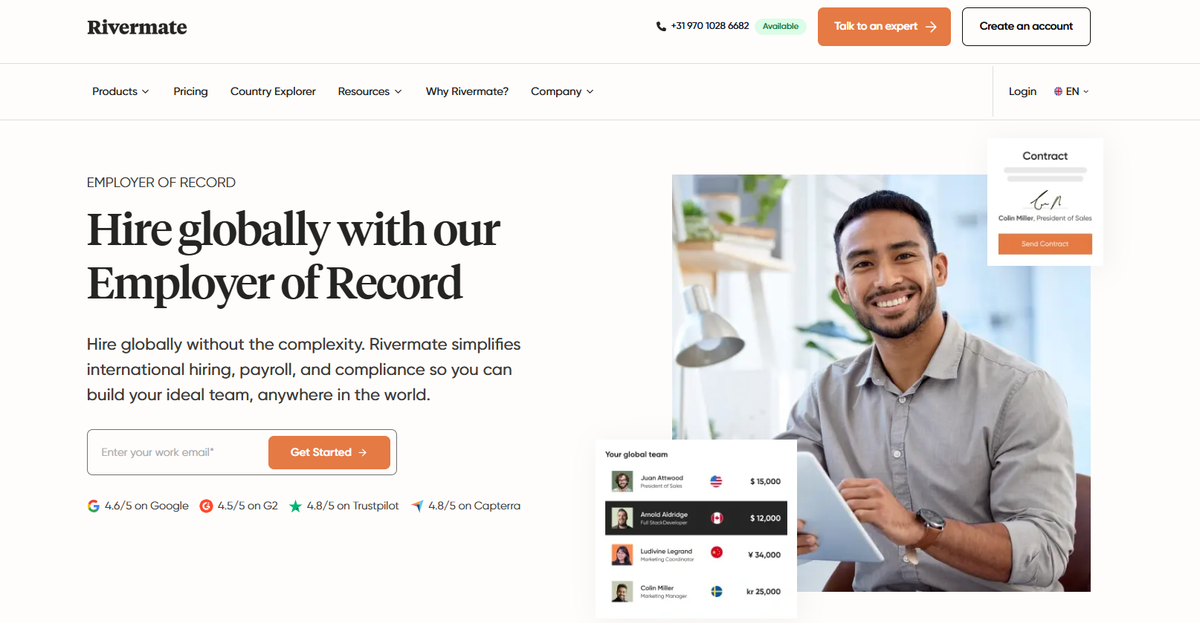
Caption: Rivermate’s employer of record services for startups
Rivermate is designed for lean teams moving fast. Built with startup realities in mind—tight timelines, small HR teams, and unpredictable hiring patterns—it offers legal-grade compliance without forcing you through ticket queues or gated dashboards. You get a single point of contact and flexible 24/7/365 support via Slack, WhatsApp, or email.
Rivermate key features
- Full EOR coverage in 150+ countries
- Dedicated account manager
- 24/7/365 human support via direct channels
- Fast onboarding (contracts auto-generated and e-signed) in 48 hours
- Unified dashboard for payroll, expenses, and onboarding
- Transparent pricing in USD, EUR, or GBP
Rivermate pros and cons
| Pros |
Cons |
| Transparent flat pricing with no hidden fees |
Not for enterprises with deep in-house infrastructure |
| Local legal support and compliance ownership |
Not built for companies with <25 total employees |
| Custom workflows for approvals and onboarding |
Since Rivermate includes legal coverage, benefits, and hands-on support, our service may be more than what a payroll-only setup requires. |
| Human support available on Slack, WhatsApp, and email |
|
Rivermate pricing
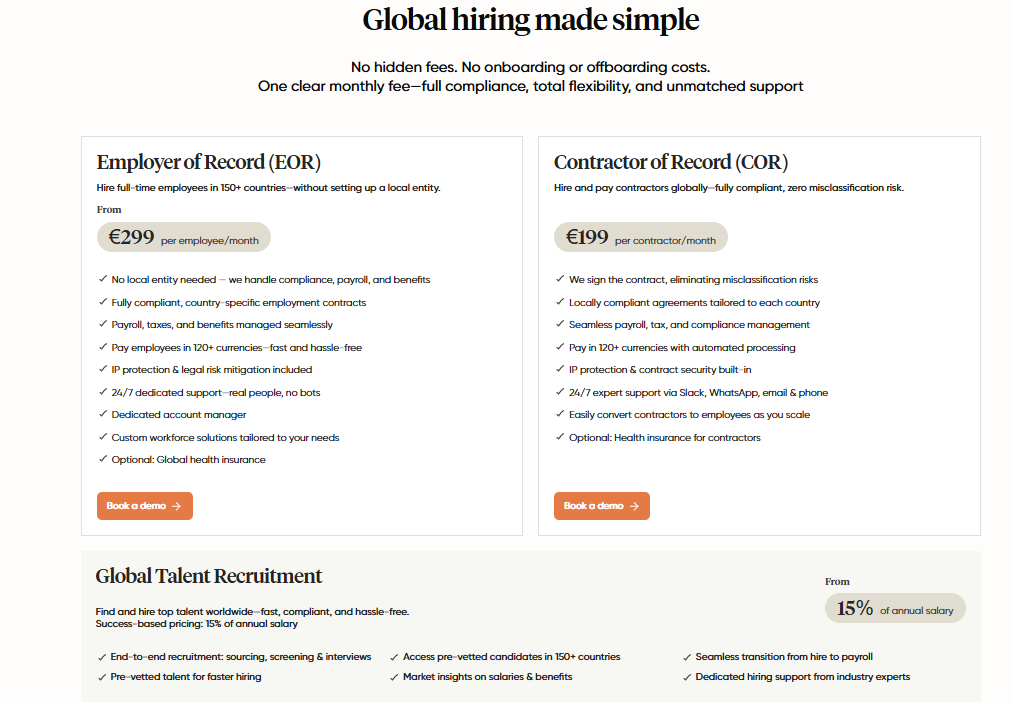
Caption: Rivermate’s pricing page
2. Deel
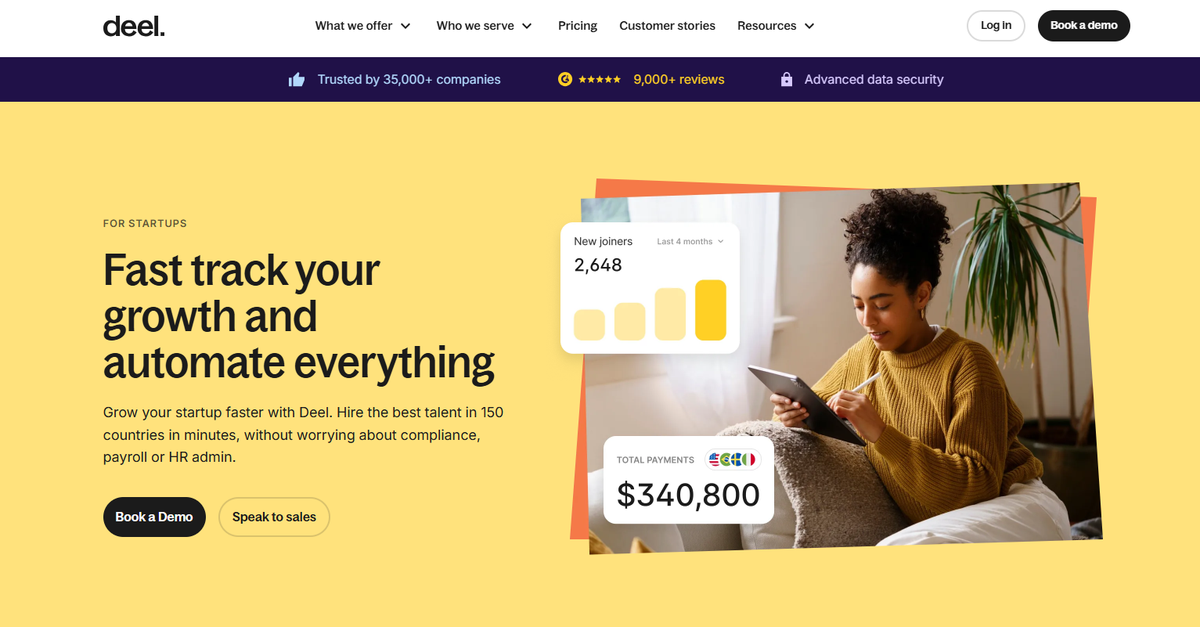
Caption: Deel’s employer of record services for startups
Deel is a fast-moving, automation-heavy platform often favored by startups that need speed over personalization. It offers rapid onboarding, automated compliance workflows, and integrated fintech tools like contractor cards and off-cycle pay.
Deel key features
- Coverage in 150+ countries
- On-demand contract generation
- Deel Advance (salary advance) and Deel Card for contractors
Deel pros and cons
| Pros |
Cons |
| Fast onboarding and easy-to-use interface (source) |
More flexibility in customizing contract templates (source) |
| Responsive customer support (source) |
User interface can feel a bit rigid when navigating more advanced contract setups (source) |
| Integrations with bank accounts are smooth and simple (source) |
Lack of additional pricing models designed specifically for startups (source) |
Deel pricing
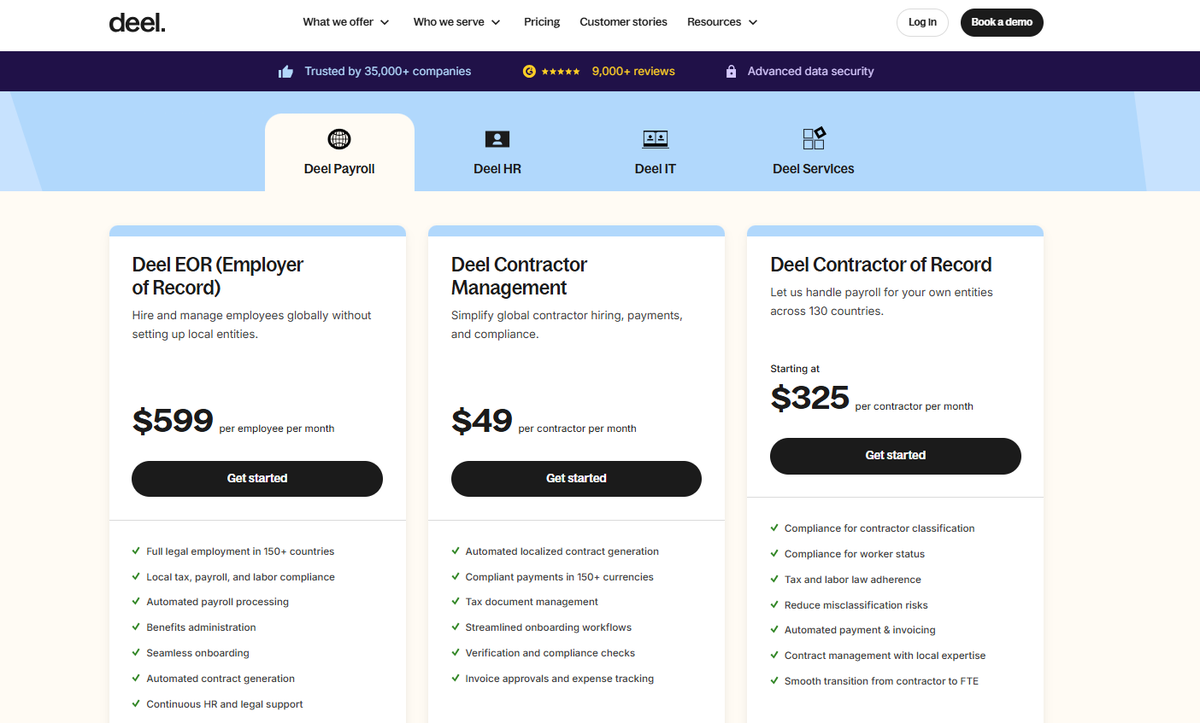
Caption: Deel’s pricing page
3. Remote
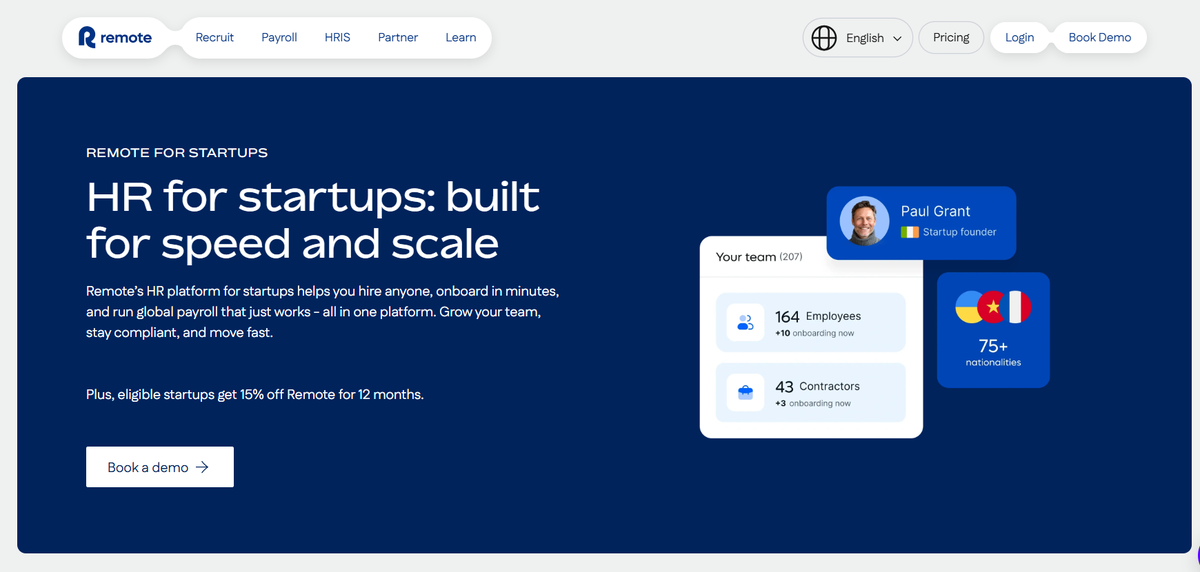
Caption: Remote’s employer of record services for startups
Remote is well-suited to startups that prioritize data privacy, control over legal entities, and strong compliance protection, especially those hiring in regulated regions like the EU.
Remote key features
- Owns legal entities in every country it serves
- Transparent pricing without markups
- Holds SOC 2 Type II and ISO 27001 certifications, demonstrating rigorous security and privacy controls
Remote pros and cons
| Pros |
Cons |
| Customer service is fast (source) |
Initial learning curve (source) |
| Localized contract templates saves startups hours of legal work (source) |
Some HR reporting features could be expanded (source) |
| Smooth and seamless onboarding (source) |
May be expensive for startups (source) |
Remote pricing
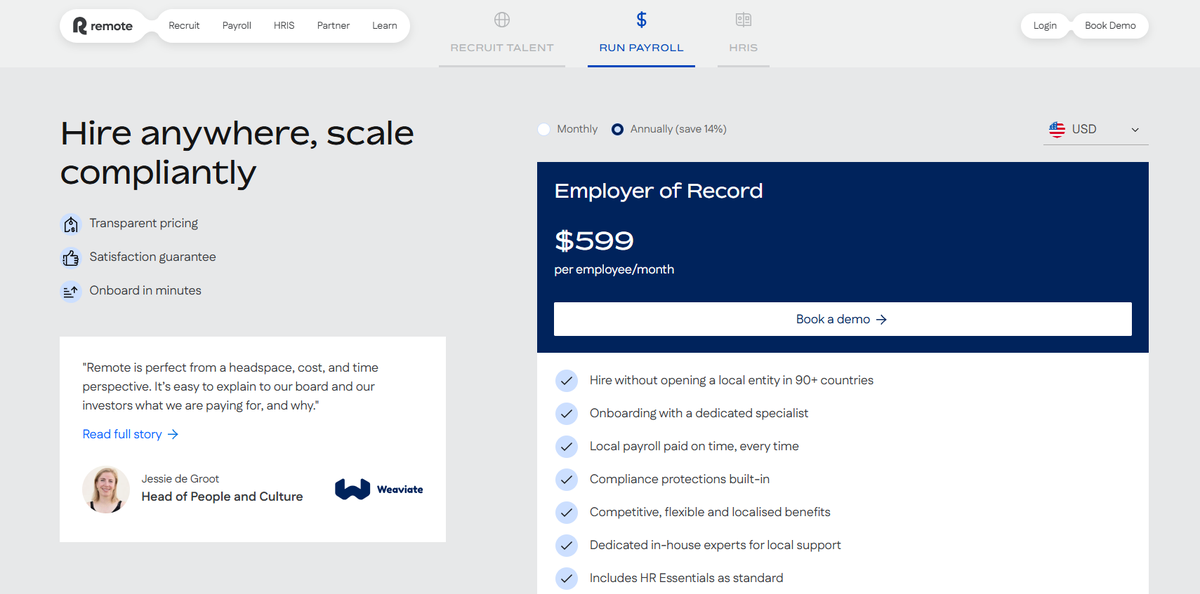
Caption: Remote’s pricing page
4. Multiplier
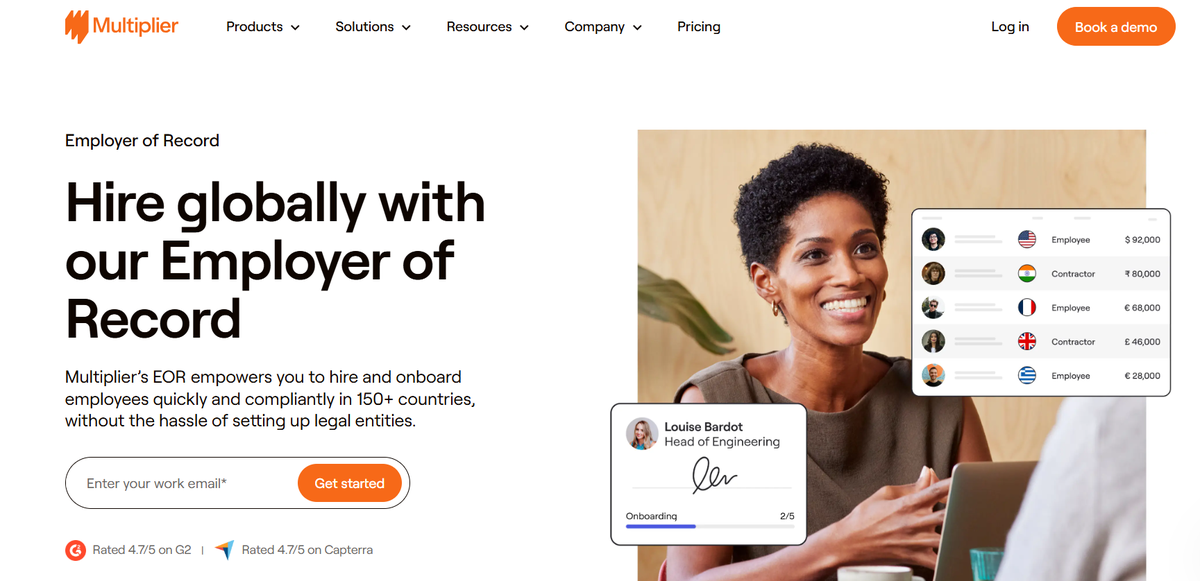
Caption: Multiplier’s employer of record services for startups
Multiplier is a strong fit for startups expanding in the Asia-Pacific region or those seeking rich customization in benefits, delivered through an intuitive interface with cost transparency.
Multiplier key features
- Fast onboarding, enabling hiring within hours or same-day in many countries
- Localized benefits packages, including country-specific insurance and leave calculations
- Offers visa and immigration assistance as part of service in supported regions
Multiplier pros and cons
| Pros |
Cons |
| Great APAC coverage and pricing transparency (source) |
Frequent changes in the customer success manager (source) |
| Website interface responsive on mobile and laptop (source) |
Lack of transparency and speed in some processes (source) |
| Affordable pricing for startups (source) |
Limited support hours (source) |
| Payment settlement time within 48 hours (source) |
|
Multiplier pricing
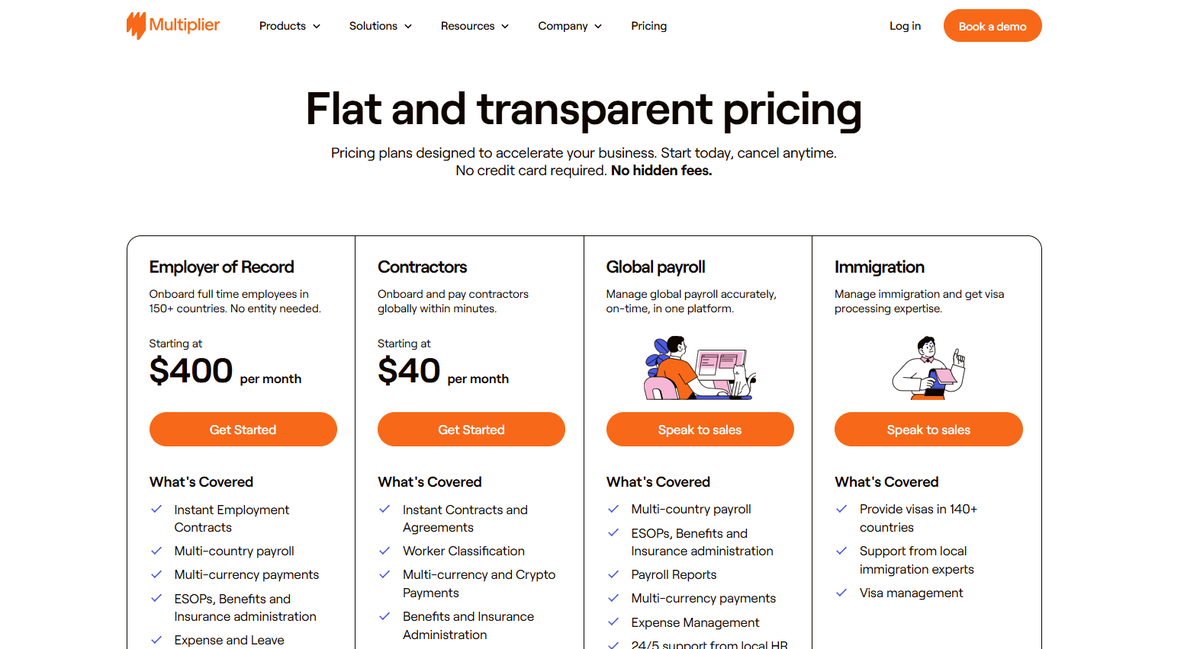
Caption: Multiplier’s pricing page
5. Skuad
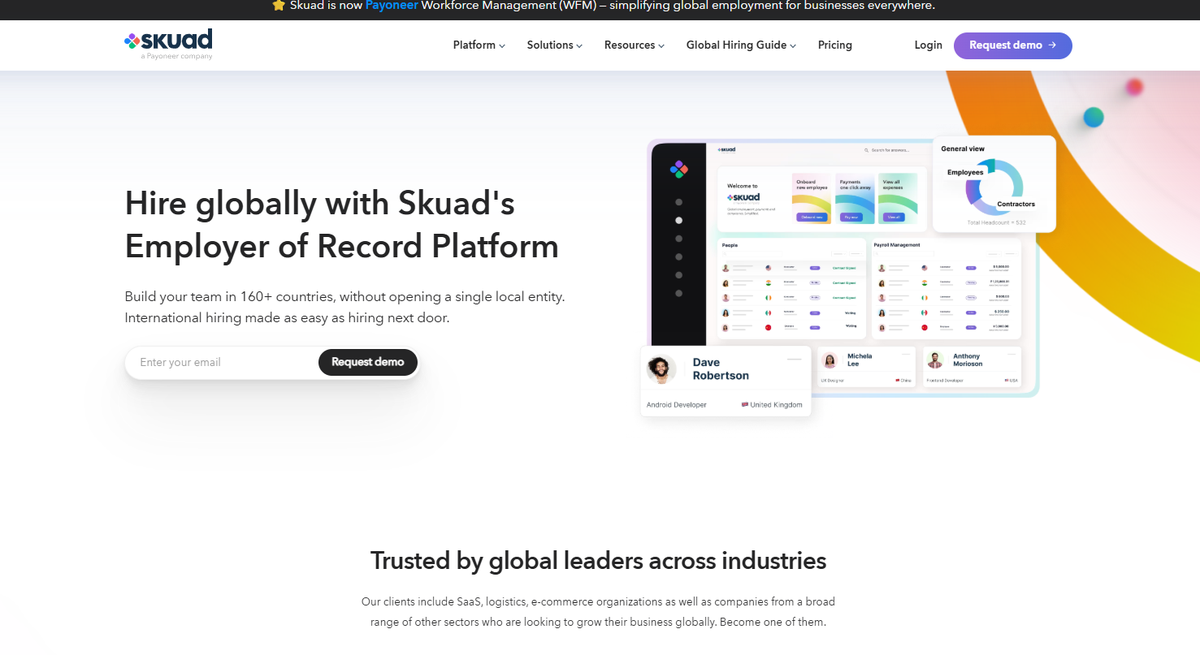
Caption: Skuad’s employer of record services for startups
Skuad delivers global hiring, payroll, and compliance in 160+ countries with transparent pricing and streamlined workflows, making it a smart fit for startups hiring across multiple regions.
Skuad key features
- Hire in 160+ countries for both full-time employees and contractors (runs payroll in 70+ currencies)
- Compliant onboarding via prebuilt contract templates and guided workflows tailored to local laws
- Flat, startup-friendly pricing starting at $199/month per employee and $19/month per contractor; no hidden fees or lock-ins
Skuad pros and cons
| Pros |
Cons |
| Portal is intuitive (source) |
User interface can feel a bit sluggish to some users (source) |
| Effective support (source) |
Payment processing times could be faster (source) |
|
Inconsistency in how certain features work (source) |
Skuad pricing
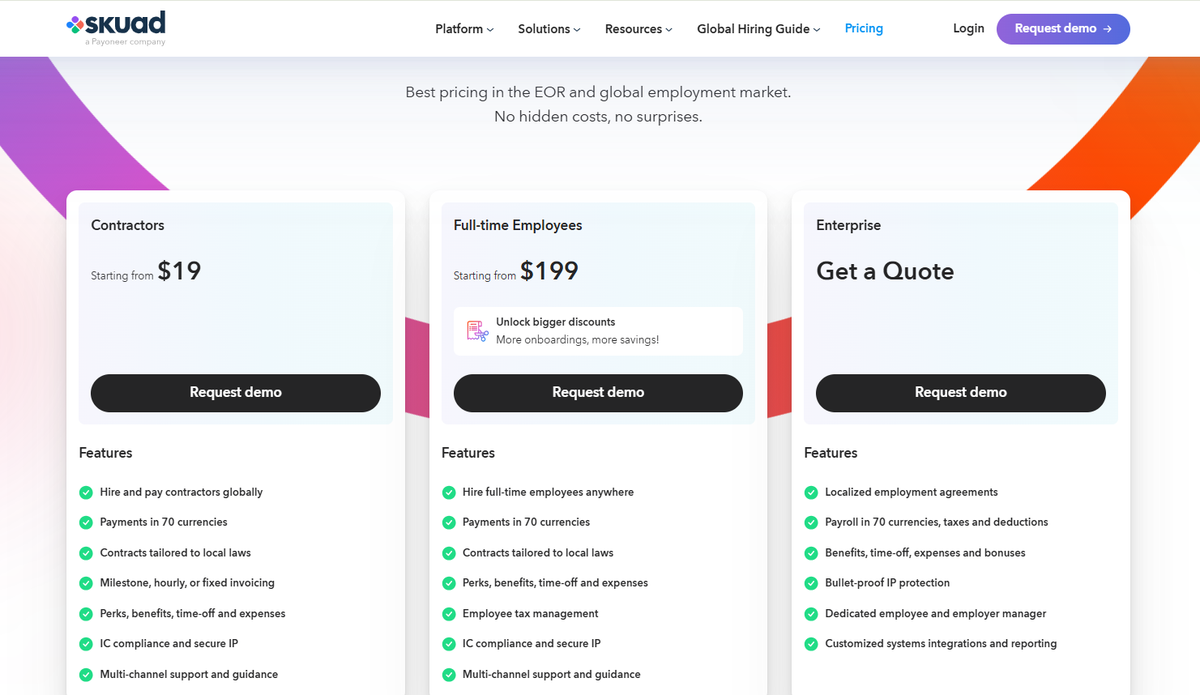
Caption: Skuad’s pricing page
6. Tarmack
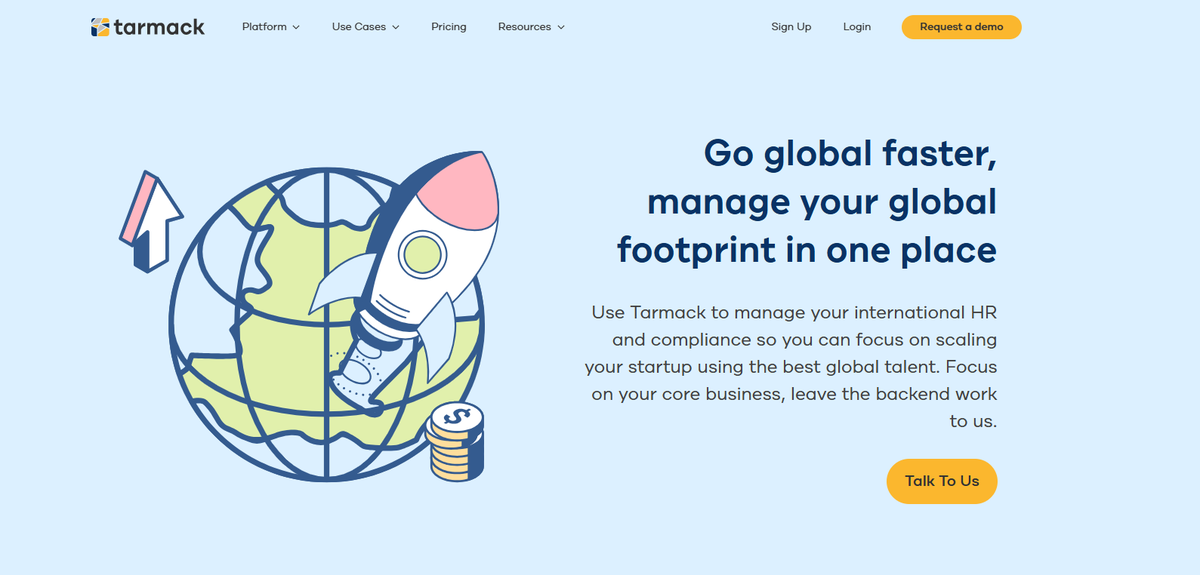
Caption: Tarmack’s employer of record services for startups
Tarmack offers a lean, founder-first Employer of Record solution, ideal for startups at Series A–B seeking expert guidance and flexible legal support without enterprise complexity.
Tarmack key features
- Legal entity presence in 150+ countries, enabling compliant hiring without entity setup
- Founded by former SaaS leaders, it offers developer-friendly tools that streamline cross-border contracting. Ideal for teams comfortable with APIs and integration-first workflows.
Tarmack pros and cons
| Pros |
Cons |
| Founder-centric support and onboarding tools (source) |
Platform less mature than bigger players like G-P or Remote (source) |
| Popular with mid-sized startups (source) |
|
| Popular among organizations building mostly in Europe or looking for a partner tuned to EU privacy realities (source) |
|
Tarmack pricing
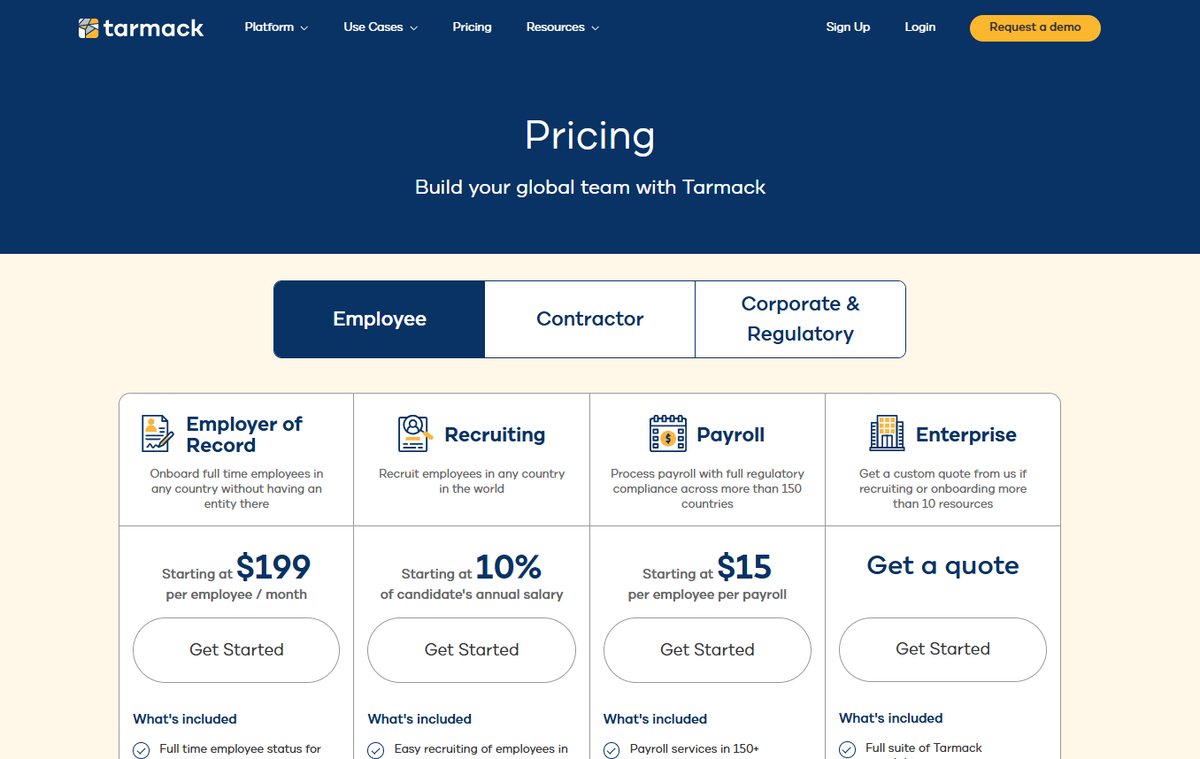
Caption: Tarmack’s pricing page
7. Globalization Partners (G-P)
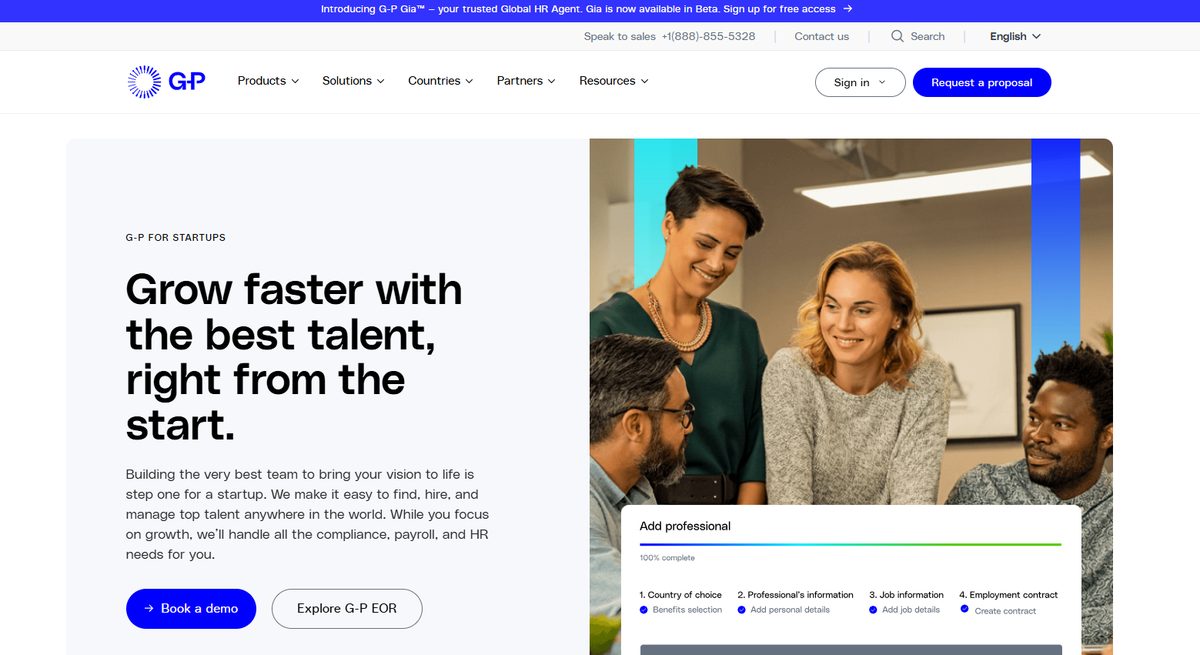
Caption: Globalization Partners’ employer of record services for startups
Globalization Partners (G-P) is a seasoned EOR provider founded in 2012, offering enterprise-level compliance and global infrastructure, well suited to later‑stage startups and larger companies needing reliable legal support across many regions.
G-P key features
- EOR offerings in over 180 countries, built on years of global employment infrastructure
- Coverage for immigration, benefits, and tax filings, managed under local legal compliance standards
- Built-in risk management content and compliance materials, including G‑P’s AI advisor for assistance with employment rules and documentation
G-P pros and cons
| Pros |
Cons |
| Their support team is responsive, well-informed, and consistently provides reliable, high-quality service (source) |
Onboarding can be tedious and confusing (source) |
|
AI chatbot often struggles to answer specific questions or offer useful guidance, especially for complex or time-sensitive issues, prompting users to submit a help ticket instead (source) |
|
Some users claim G-P gave false information during sales calls, lacks local support and legal knowledge, and mishandled payroll. (source) |
G-P pricing
Custom quote
8. Velocity Global
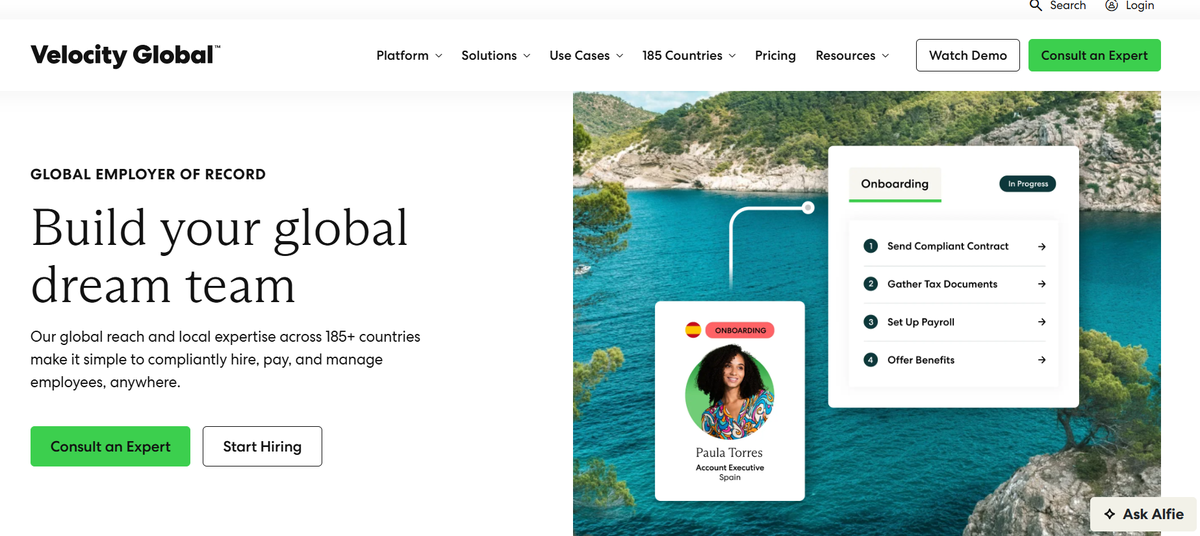
Caption: Velocity Global’s employer of record services for startups
Velocity Global offers Employer of Record & [global payroll services] across 185+ countries, making it a trusted platform for startups with dedicated legal or operations teams. Its architecture emphasizes risk mitigation through detailed documentation and audit-ready compliance tracks.
Velocity Global key features
- 240+ in-country legal, payroll, HR, and immigration experts
- Local 24/7 concierge-level customer support
- Onboard employees in as little as 48 hours
Velocity Global pros and cons
| Pros |
Cons |
| Responsive customer support (source) |
Higher cost than platforms like Rivermate or Skuad. May not be suitable for startups. (source, source) |
| More affordable than competitors (source) |
|
| Smooth onboarding (source) |
|
| User-friendly and easy to navigate (source) |
|
Velocity Global pricing
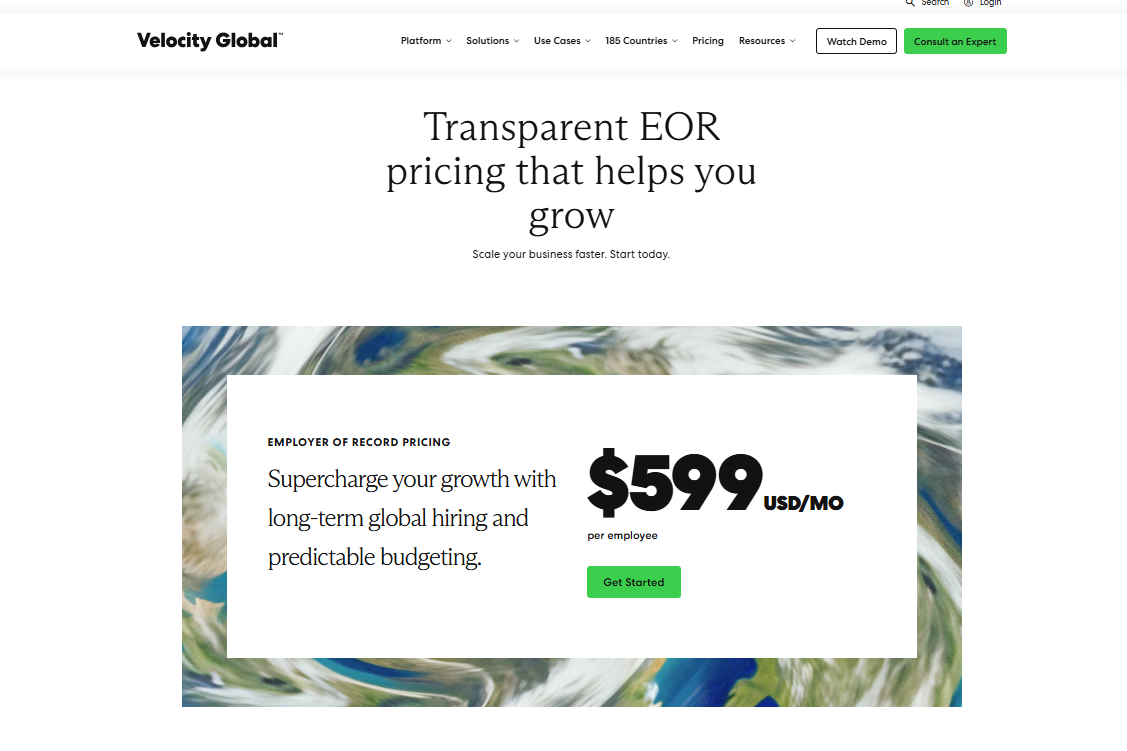
Caption: Velocity Global’s pricing page for EOR services
9. Rippling
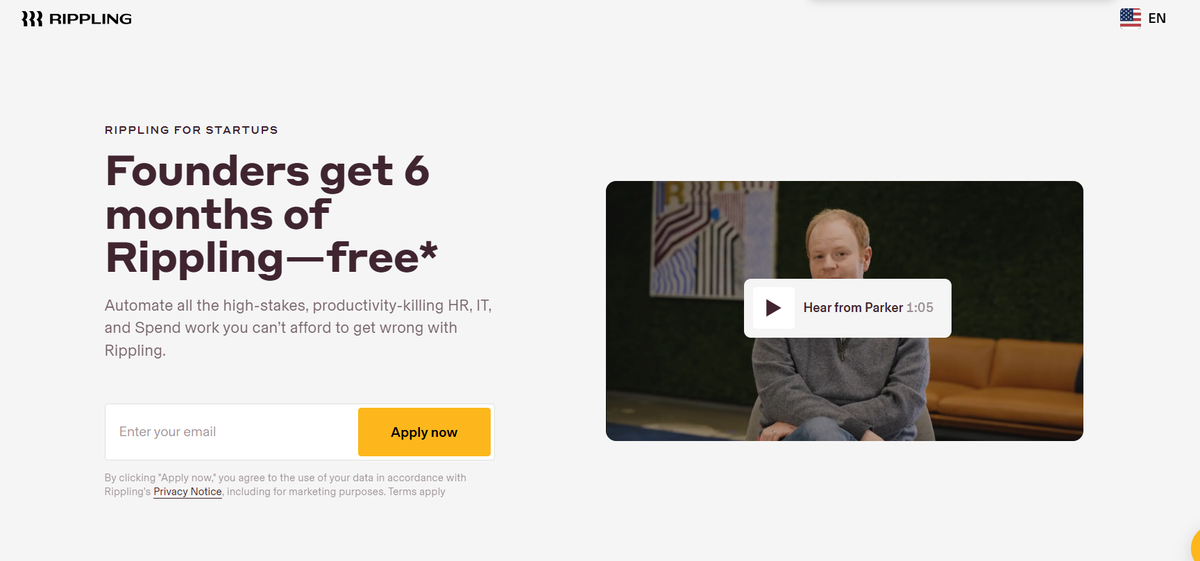
Caption: Rippling’s employer of record services for startups
Rippling combines HRIS, IT, finance, and global hiring into a single ecosystem. It’s ideal for US-first startups that want everything under one roof, but it may be too feature-heavy (and costly) for smaller teams.
Rippling key features
- Modular pricing structure, with flat per-user base fee plus add-on modules per feature (e.g. performance, recruiting, expense management)
- Integrations with hundreds of third-party apps
- Strong automation and workflow capabilities, including onboarding, time tracking, benefits administration, and finance tasks
Rippling pros and cons
| Pros |
Cons |
| User interface is intuitive and modern (source) |
Global coverage limited to ~80 EOR countries as of early 2026, not as deep as dedicated EORs (source) |
| Quick onboarding in days (source) |
Lack of customization (source) |
|
Steep initial learning curve, particularly when configuring custom workflows (source) |
|
The abundance of options can feel overwhelming at first, requiring training and hands-on use to get comfortable (source) |
Rippling pricing
Custom quote
10. Papaya Global
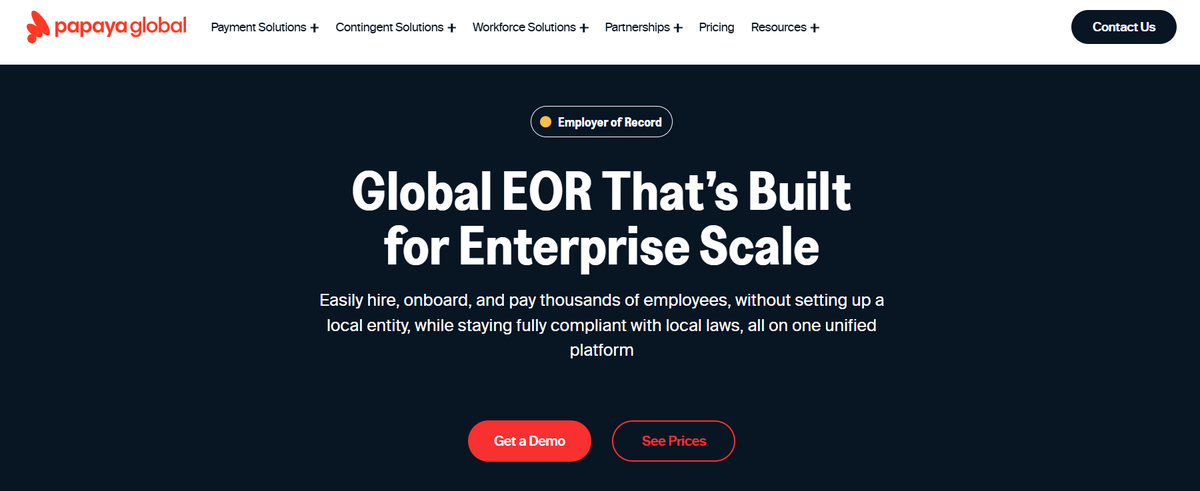
Caption: Papaya Global’s employer of record services for startups
Papaya Global is frequently chosen by finance-led teams managing multi-entity HR and payroll operations. It delivers robust tools for financial control, multi-currency processing, and executive-level visibility.
Papaya Global key features
- Operates via an aggregator model, partnering with vetted local providers in 160+ countries rather than owning legal entities directly
- Offers real-time financial dashboards, headcount/churn analytics, and forecasting through advanced BI tools
- Supports payments and invoicing in multiple currencies, leveraging a unified payroll system across regions
Papaya Global pros and cons
| Pros |
Cons |
| User friendly (source) |
Not startup-specific; more suited to operationally mature teams |
| Exceptional customer support (source) |
Lack of own entities in countries (source) |
| Low, predictable fees (source) |
|
| Great reporting capabilities (source) |
|
Papaya Global pricing
Custom pricing available
Choosing the right EOR for your startup
Startups don’t just need a global employment provider. They need a partner who can match their pace, risk profile, and long-term goals. The “right” EOR depends on where you are in your growth journey and what kind of support your team needs most.
Here’s how to think about choosing:
-
If you're hiring your first global employee
Prioritize simplicity, onboarding speed, and responsive support. Tools like Skuad or Tarmack are ideal at this stage. They offer low overhead and fast contract setup, without forcing you into long-term commitments or bloated pricing.
-
If you're looking to hire at least 10-15 new employees in each new country
At this stage, legal complexity grows fast. You’ll want country-specific contract reviews, payroll forecasting, and advice on statutory benefits.
Rivermate, Multiplier, or Remote work well here. Each offers strong international coverage and documentation. If APAC is in focus, Multiplier’s regional expertise is especially helpful.
Rivermate: your partner for compliant global hiring
Choosing the right employer of record for your startup is more than a checkbox. It’s a strategic decision that shapes how you grow.
Rivermate is the right fit if you value:
-
Responsive, human support: Talk to real people on Slack or WhatsApp. No chatbots, no queues.
-
Compliance peace of mind: Local legal experts monitor laws daily and update contracts automatically.
-
Clear, predictable pricing: Flat monthly rates with no hidden fees or surprise taxes
-
Startup-aligned service: Fast onboarding, flexible workflows, and scalable support across 150+ countries
Whether you’re hiring one employee abroad or building a distributed team across regions, the right global employer of record lets you move fast, stay compliant, and avoid operational debt.
Book a 30-minute consultation with us to see how Rivermate handles onboarding, payroll, and legal compliance in 150+ countries.
FAQs
Why use an EOR for startups?
Startups use EORs to move faster and reduce legal risk when hiring globally. Instead of spending months and thousands setting up entities, EORs let startups onboard employees compliantly in days.
How does an EOR differ from a PEO?
A Professional Employer Organization (PEO) co-employs workers in your home country and shares employment responsibility. An EOR fully takes on the legal employer role in foreign countries, making it a better fit for international hiring.
Is using an EOR legal?
Yes, using a reputable Employer of Record is a fully legal way to hire talent internationally. EORs operate through registered local entities and follow each country’s labor laws, tax codes, and compliance regulations. It’s a standard approach used by startups and enterprises alike to scale globally without violating employment rules.






















